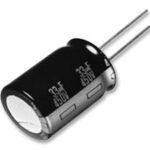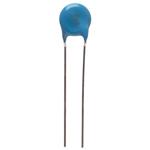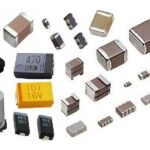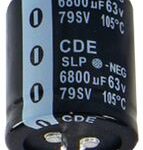Aluminum Organic Polymer Capacitors
Aluminum Organic Polymer Capacitors represent a significant advancement over traditional aluminum electrolytic capacitors that use liquid electrolytes. This paper discusses the limitations of conventional electrolytic capacitors and highlights how organic polymer capacitors deliver enhanced performance.
Capacitors generally consist of two conductive plates (electrodes) separated by an insulating material (dielectric). Electrolytic capacitors are polarized devices, meaning they must maintain a specific voltage polarity—one terminal always more positive than the other. Applying reverse voltage can cause damage.
Organic polymer capacitors use a solid conductive polymer as the cathode, offering optimized performance across a wide range of applications. They combine ultra-low Equivalent Series Resistance (ESR) with excellent capacitance stability at high frequencies and come in various sizes to suit different design needs.
Key advantages of Aluminum Polymer Capacitors include:
Ultra-low ESR for better efficiency
Compact size for space-sensitive designs
High ripple current capability for demanding power conditions
High endurance supported by temperature derating
Safer short-circuit behavior compared to tantalum capacitors
These features make aluminum polymer capacitors ideal for the most demanding electronic applications.
Showing 1–9 of 12 results
-

20SVPB15M SANYO Capacitor Aluminum 15uF 20V SMD, 6.3X4.9mm Radial
Read more -

2SEPC560MZ Panasonic Capacitor 2.5VDC, 560uF, Radial
Read more -

450BXC33MEFC16X25 CAP ALUM 33UF 450V 20% RADIAL RoHS
Read more -

870055673001, WURTH Organic Polymer Capacitor 10uF 35V 20%, Radial
Read more -

99287-4-7320 Ebm-Papst Capacitor, Plastic, 10UF 400V
Read more -

APXA4R0ARA681MJ80G UCC CAPACITOR POLYMER 680UF 20% 4V SMD RoHS
Read more -

AVX ML03V11R0AAT2A Capacitor 1.0pF 250VDC SMD 0603
Read more -

Cornell Dubilier SLPX222M200H9P3 Capacitor 2200uF 200V 20% Snap-In
Read more -

EEF-UE0G271LR PANASONIC CAPACITOR POLYMER 270UF 20% 4V SMD RoHS
Read more